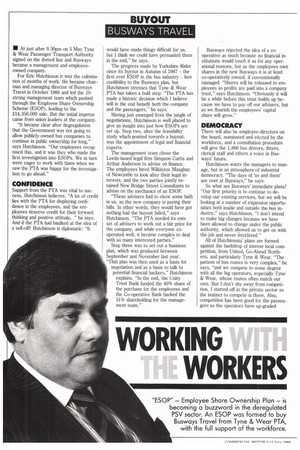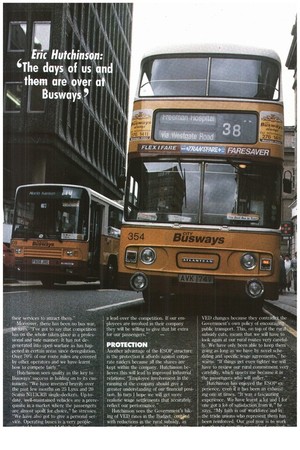WORKING WORKERS
Page 52

Page 53

If you've noticed an error in this article please click here to report it so we can fix it.
"ESOP" — Employee Share Ownership Plan — is becoming a buzzword in the deregulated PSV sector. An ESOP was formed to buy Busways Travel from Tyne & Wear PTA, with the full support of the workforce.
N At just after 9.30pm on 5 May Tyne & Wear Passenger Transport Authority signed on the dotted line and Busways became a management and employeeowned company.
For Eric Hutchinson it was the culmination of months of work. He became chairman and managing director of Busways Travel in October 1986 and led the 10strong management team which pushed through the Employee Share Ownership Scheme (ESOP), leading to the 214,350,000 sale. But the initial impetus came from union leaders at the company.
"It became clear after degreguIation that the Government was not going to allow publicly-owned bus companies to continue in public ownership for long," says Hutchinson. "Our employees recognised this, and it was they who made the first investigation into ESOPs. We in turn were eager to work with them when we saw the PTA was happy for the investigation to go ahead."
CONFIDENCE
Support from the PTA was vital to success, Hutchinson believes. "A lot of credit lies with the PTA for displaying confidence in the employees, and the employees deserve credit for their forward thinking and positive attitude, "he says. And if the PTA had baulked at the idea of a sell-off? Hutchinson is diplomatic: "It would have made things difficult for us, but I think we could have persuaded them in the end," he says.
The progress made by Yorkshire Rider since its buyout in Autumn of 1987 — the first ever ESOP in the bus industry — lent credibility to the Busways plan, but Hutchinson stresses that Tyne & Wear PTA has taken a bold step: "The PTA has made a historic decision which 1 believe will in the end benefit both the company and the passengers," he says.
Having just emerged from the jungle of negotiations, Hutchinson is well placed to give an insight into just how ESOPs are set up. Step two, after the feasability study which pointed towards a buyout, was the appointment of legal and financial experts.
The management team chose the Leeds-based legal firm Simpson Curtis and • Arthur Anderson to advise on finance. The employees hired Wilkinson Maughan of Newcastle to look after their legal interests, and the two parties jointly retained New Bridge Street Consultants to advise on the mechanics of an ESOP.
"These advisers had to show some faith in us, as the new company is paying their bills. In other words, they would have got nothing had the buyout failed," says Hutchinson. "The PTA needed its own set of advisers to work out a fair price for the company, and while everyone cooperated well, it became complex to deal with so many interested parties."
Step three was to set out a business plan, which was produced between September and November last year. "That plan was then used as a basis for negotiation and as a basis to talk to potential financial backers," Hutchinson explains. "In the end, the Unity Trust Bank funded the 49% share of the purchase for the employees and the Co-operative Bank backed the 51% shareholding for the manage ment team." Busways rejected the idea of a cooperative as much because no financial institutions would touch it as for any operational reasons, but as the employees own shares in the new Busways it is at least co-operatively owned, if conventionally managed. "Shares will be released to employees as profits are paid into a company trust," says Hutchinson. "Obviously it will be a while before this trust builds up because we have to pay off our advisers, but as we flourish the employees' capital share will grow."
DEMOCRACY
There will also be employee-directors on the board, nominated and elected by the workforce, and a consultation procedure will give the 1,800 bus drivers, fitters, clerical staff and others a voice in Busways' future.
Hutchinson wants the managers to manage, but in an atmosphere of industrial democracy. "The days of 'us and them' are over at Busways," he says.
So what are Busways' immediate plans? "Our first priority is to continue to develop our existing services, but we will be looking at a number of expansion opportunities both inside and outside the bus industry," says Hutchinson. "I don't intend to make big changes because we have been allowed to change under the public authority, which allowed us to get on with the job and never interfered."
All of Hutchinsons' plans are formed against the backdrop of intense local competition, from United, Go-Ahead Northern, and particularly Tyne & Wear. "The pattern of bus routes is very complex," he says, "and we compete to some degree with all the big operators, especially Tyne & Wear, whose routes often match our own. But I don't shy away from competition. I started off in the private sector so the instinct to compete is there. Also, competition has been good for the passengers as the operators have up-graded their services to attract them."
Moreover, there has been no bus war, .41,7-litatial's: "I've got to say that competition has on the whole taken place in a professional and safe manner. It has nut degenerated into open warfare as has happened in certain areas since deregulation. Over 70ci of our route miles are covered by other operators and we have learnt how to compete fairly."
Hutchinson sees quality as the key to Busways' success in holding on to its customers. "We have invested heavily over the past few months on 25 Lynx and 20 Scania N113CRB single-deckers. Up-todate, well-maintained vehicles are a prerequisite in a market where the passengers are almost spoilt for choice," he stresses. "We have also got to give a personal service. Operating buses is a very people a lead over the competition. If our employees are involved in their company they will be willing to give that bit extra for our passengers."
PROTECTION
Another advantage of the ESOP.structure is the protection it affords against corporate raiders because all the shares are kept within the company. Hutchinson believes this will leadlo improved industrial relations: "Employee involvement in the running of the company should give a greater understanding of our financial position. In turn I hope we will get more realistic wage settlements that accurately reflect our performance."
Hutchinson sees the Government's hiking of VED rates in the Budget, coulied with reductions in the rural subsidy, as VED changes because they contra the
Government's own policy of encoural; public transport. This, on top of the rill' subsidy cuts, means that we will have .to look again at our rural routes very carefully. We have only been able to keep them going as long as-we have by novel scheduling and specific wage agreements," he wiiins. "If things get even tighter we will. have to review our rural commitment very carefully, which upsets me because it -is :the passengers who will suffer." Hutchinson has enjoyed the ESOP experience, even if it has been an exhausting one at times. "It was a fascinating experience. We have learnt a lot and I for one got a lot of satisfaction from it," he says. ''My faith in our workforce and in the trade unions who represent them has been reinforced. Our goal now is to work












































































































































